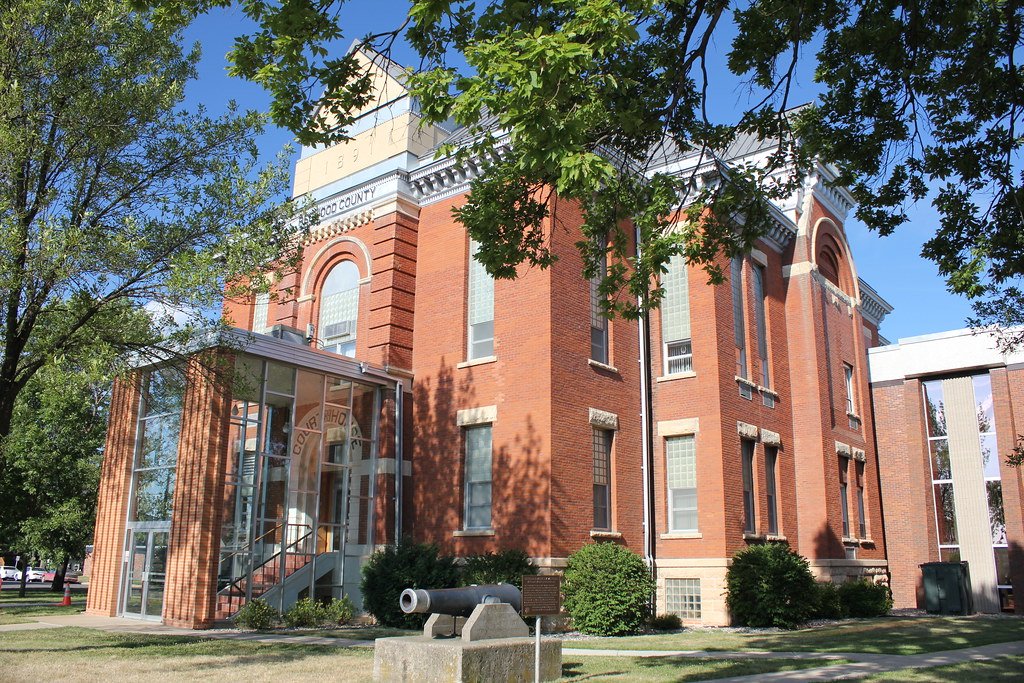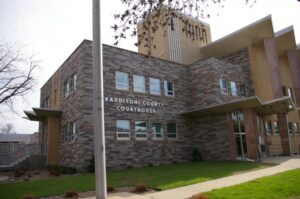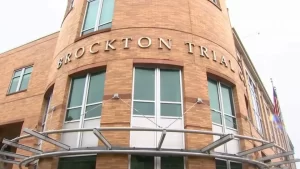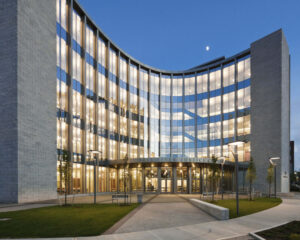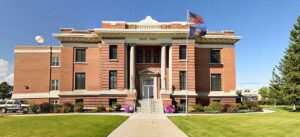Redwood County District Court
Time
Working Hours:
Monday through Friday from 8:00 a.m. to 4:30 p.m.
Saturday: closed
Sunday: closed
Connect with a Attorney
Overview of Redwood County District Court
The Redwood County District Court is the judicial branch serving Redwood County in southwestern Minnesota. As part of the state’s 10th judicial district, the court handles a variety of civil, criminal, and family court cases at the county level. The courthouse is located in Redwood Falls, the county seat.
History of Redwood County District Court
Redwood County was established in 1862, with the district court opening soon after. The courthouse was constructed in 1879 and has undergone several renovations and expansions over the years. Currently, the court has two judges who are elected to six-year terms. The court handles over 2,000 new case filings per year across its jurisdictions.
Redwood County Courthouse
The Redwood County Courthouse is located at 250 S Jefferson St in Redwood Falls, MN. The courthouse was built in 1887 and is listed on the National Register of Historic Places. It contains multiple courtrooms and hearing rooms as well as offices for the county clerk of court, court administration, and other court services.
There are three main courtrooms located in the courthouse – Courtroom 1, Courtroom 2, and Courtroom 3. Courtroom 1 is the largest and is used for jury trials as well as high-profile cases. Courtroom 2 handles non-jury trials, motions hearings, and other proceedings. Courtroom 3 is the small claims courtroom. There are also several hearing rooms used for initial appearances, arraignments, and conferences.
Redwood County Court Administration
The Redwood County Clerk of Court handles administration for the county court system. The clerk’s office provides services such as:
- Maintaining court records, filings, and the court calendar
- Providing copies of records and filings to attorneys and the public
- Processing new case filings
- Collecting court fines and fees
- Issuing marriage licenses
Many court records can be accessed through the Minnesota Court Records Online website. This site provides online access to criminal, civil, family, and probate case records. Users can search cases, view calendars, and purchase copies of documents.
Jurisdiction and Location of Redwood County District Court
The Redwood County District Court is located inside the historic Redwood County Courthouse in downtown Redwood Falls. As a district court, it has jurisdiction over civil, criminal, and family court cases arising within the county. Appeals are taken to the Minnesota Court of Appeals.
Structure and Operations of Redwood County District Court
The Redwood County District Court has two elected judges who serve six-year rotating terms. The chief judge oversees court administration and assignments. There is also court administration staff, court reporters, law clerks, and other personnel who keep operations running smoothly. The court generally hears cases four days per week.
Notable Cases and Judges of Redwood County District Court
Over the years, the Redwood County District Court has handled several high-profile murder trials, discrimination lawsuits, and other major cases. Notable judges include Chief Judge David Larson, known for his no-nonsense approach, and Judge Margaret Smith, recognized for her work on expanding court services.
Jurisdiction and Operations of Redwood County District Court
The Redwood County District Court hears a variety of case types under its civil, criminal, and family court jurisdiction. The court handles full operations and staffing needs to serve the local community.
Types of Cases Heard In Redwood County
The Redwood County Court system handles a range of different types of legal cases including:
Criminal Cases
Criminal cases involve prosecuting those accused of committing crimes. These include both felony cases involving major crimes and misdemeanor cases for lesser offenses. Criminal proceedings include initial appearances, arraignments, trials, sentencing, and more.
Civil Cases
Civil court handles disputes between individuals, organizations, or government entities. Common civil cases include contract disputes, personal injury lawsuits, medical malpractice, small claims, and others.
Family Cases
Family court handles matters involving family relationships and domestic issues. Proceedings include divorce, child custody and support, domestic violence protection, and more.
Probate Cases
Probate court handles issues relating to wills, inheritance, and estates of deceased persons. This also includes guardianships and conservatorships.
Criminal Cases
Criminal cases make up a significant portion of the Redwood County court calendar. These involve prosecuting those accused of committing misdemeanor and felony crimes.
Felony Cases
Felony cases involve major crimes such as murder, robbery, assault, fraud, and drug offenses. Felony cases begin with a complaint and affidavit of probable cause followed by an initial appearance.
Defendants have the right to a preliminary hearing where the prosecution must establish probable cause that the defendant committed the crime. If probable cause is found, the case proceeds to an arraignment where charges are formally presented and a plea entered.
Felony cases can proceed to trial before a judge or jury. Defendants may also plead guilty and proceed directly to sentencing. Trials and sentencing hearings are scheduled on the court calendar.
Misdemeanor Cases
Misdemeanor crimes involve minor offenses punishable by less than one year in jail. These include petty theft, simple assault, driving under the influence (DUI), disorderly conduct, and more.
Misdemeanor cases follow a similar process to felonies. After charges are filed, defendants appear for an initial hearing, enter a plea at arraignment, and may take their case to trial. However, misdemeanor trials are always held before a judge rather than a jury.
Initial Appearance
The initial appearance is the first time a defendant appears in court after being arrested. At this hearing, defendants are:
- Informed of their rights and the charges against them
- Appointed legal counsel if they cannot afford a lawyer
- Given the opportunity to enter a plea
- Have bail set if they are in custody
Initial appearances must occur within 36 hours of an arrest. These hearings are scheduled quickly and may occur any day of the week.
Arraignments
At an arraignment, formal charges are presented to the defendant. They are asked to enter a plea – guilty, not guilty, or no contest. The judge ensures the defendant understands their rights and the charges against them. If a not guilty plea is entered, the next court appearance will be scheduled.
Arraignments typically occur within 1-2 weeks of an initial appearance for those out of custody. In-custody defendants are arraigned within 5 days of their arrest.
Trials
Criminal trials are scheduled weeks or months after arraignment. The court calendar lists the dates and courtroom for jury trials and court trials (bench trials before a judge only).
Jury trials often take multiple days or weeks to complete. A large pool of potential jurors may be called to complete jury selection. The trial itself involves opening statements, witness testimony, evidence presentation, closing arguments, and jury deliberations.
Bench trials for misdemeanors take less time, often lasting a day or less. The judge hears the evidence and makes a determination of guilt or innocence.
Sentencing
Sentencing hearings are scheduled approximately 6-8 weeks after a guilty plea or conviction. Judges review sentencing guidelines and recommendations to determine the appropriate sentence. Sentences imposed may involve jail or prison time, probation, fines, and other conditions.
Civil Cases
Civil court handles a wide variety of legal disputes between parties. Common types of civil cases include:
Contract Disputes
Contract disputes involve claims of breach of contract or disputes over contract terms. These often involve consumer complaints, employment disputes, real estate agreements, and business partnerships.
Personal Injury
Personal injury lawsuits seek compensation for injuries and damages suffered due to another party’s negligence. Cases may involve motor vehicle accidents, premises liability, medical malpractice, and more.
Malpractice
Medical malpractice cases involve allegations of professional negligence by doctors, nurses, hospitals, and other healthcare providers. Legal malpractice claims involve misconduct or negligence by attorneys.
Small Claims
Small claims court handles minor financial disputes up to $15,000 in Minnesota. Plaintiffs often represent themselves rather than hire attorneys. Hearings are informal and typically last around 30 minutes or less.
For civil cases, the court calendar schedules events like preliminary hearings, status conferences, settlement conferences, motions hearings, and trials. The clerk of court can provide copies of calendars and scheduling orders.
Family Cases
Family court handles sensitive domestic disputes involving spouses, parents, and children. Proceedings focus on issues like:
Divorce
Contested divorces go through a series of court events including status conferences, settlement conferences, and finally divorce trials. Uncontested divorces simply require a final hearing to finalize.
Child Custody
Child custody disputes involve determining physical and legal custody arrangements for minor children. This may require custody evaluations, guardian ad litem appointments, and contested hearings.
Child Support
Child support orders establish the amount of support to be paid by the non-custodial parent. Support can be determined through settlement or contested hearings if parents cannot agree.
Domestic Violence
Domestic violence protection involves obtaining restraining orders against abusive family members. Hearings scheduled in these cases are expedited for safety.
Status conferences, motions hearings, and trials are all scheduled for family court cases. The family court calendar outlines relevant dates and times.
Probate Cases
Probate court handles estate matters such as:
Wills
Informal probate of wills requires submitting the will and filing for probate. Formal probate involves additional filings and a court hearing to validate the will. Contested wills require a trial.
Estates
The probate process guides administration of estates whether there is a will (testate) or not (intestate). The court oversees tasks like inventorying assets, publishing notices, and distributing assets.
Guardianships
Guardianship appointments for minors or incapacitated persons involve determining the appropriate guardian and establishing the guardianship. Annual accountings are filed once appointed.
Conservatorships
Conservatorships involve appointing someone to manage finances for an incapacitated person. Hearings are required to establish and then review conservatorships annually.
Key events like petitions, accountings, and appointments are scheduled on the probate court calendar.
Court Operations and Staffing
Court administration oversees daily operations, including clerk’s office activities, legal Records, Interpreters, probation, scheduling, and information services. There are also court reporters, law clerks for the judges, bailiffs, and other staff.
Budget and Funding
As part of Minnesota’s 10th judicial district, the Redwood County District Court receives state funding and grants. The county provides the courthouse, facilities, and staff salaries. The annual budget is approximately $3 million.
Facilities and Technology of Redwood County District Court
The Redwood County District Court utilizes the historic county courthouse along with modern amenities and technology. This supports its operations and provides accessibility.
Courthouse and Courtrooms
The courtrooms are located inside the main Redwood County Courthouse, featuring restored early 20th century architecture and decorative details. There are two main courtrooms, judge’s chambers, and meeting rooms.
Security and Accessibility
The courthouse has security screening at the entrance and secured access throughout the building. The court aims to provide full ADA accessibility for those with disabilities. Interpretation services are also offered.
Online Services and Records
Many court records are available online, such as calendars, dockets, and document searches. Some services like fee payments and filing requests can be completed electronically through the court’s website.
Online Resources for Redwood County District Court
Accessing Court Case Records
Online Public Access
Gone are the days of physically visiting a courthouse to access court records. With the Redwood County District Court’s online public access system, you can search for Minnesota criminal, traffic, civil, family, and probate case records from the comfort of your home or office. It’s a user-friendly platform that provides easy navigation and quick results.
Maintenance Schedule
Please note that online public access to case records is unavailable every Sunday from 11 a.m. until approximately 2 p.m. for regular system maintenance. Plan your searches accordingly to avoid inconvenience.
Minnesota Criminal Case Records
Comprehensive Criminal History
For those interested in an individual’s criminal history, the Redwood County District Court offers an online search feature. You can find details related to arrests, offenses, convictions, and sentencing by entering a name and date of birth. This resource is invaluable for background checks and legal research.
Methamphetamine Registry
Additionally, the court provides a specialized methamphetamine registry search. It’s a valuable tool for law enforcement agencies and anyone concerned about individuals involved in methamphetamine-related activities.
Dockets, Calendars, and More
Finding Case Information
The court’s database offers detailed information about each case, ensuring you have access to the most relevant data, including case history and upcoming hearings.
Easy Calendar Searches
Searching for court calendars in Minnesota is a breeze with the Redwood County District Court’s online system. You can filter results by county, attorney, case number, judicial officer, party or defendant name, date range, and case category. This feature is especially helpful for legal professionals and individuals tracking specific cases.
Understanding the Court Calendar
The court calendar provides scheduling information for cases before the court. Calendars are organized by courtroom or judge and date. They list cases with scheduled events for each day.
Assignment of Cases
New case filings are assigned to a judge or referee. Misdemeanor criminal cases are assigned randomly. Civil, family, and probate cases may be assigned based on subject matter or judge availability.
Scheduling Hearings and Trials
Judges and court administration schedule hearings, conferences, and trials based on time estimates, courtroom availability, and schedule conflicts. Sufficient notice is provided to parties.
Tracking Case Progress
Parties involved in a case can track its progress by reviewing calendars for upcoming events. Rescheduling is common as cases evolve so regularly checking for updates is recommended.
Calendars provide a general timeframe for proceedings but specific dates and times may shift around. Relying solely on issued notices is best to confirm appearances.
Accessing the Court Calendar
The Redwood County court calendar can be accessed through the following methods:
Online Calendar
The calendar is posted online through Minnesota Court Records Online. Users can search by date, judge, or case number to view scheduled proceedings.
Courthouse Postings
Printed daily calendars are posted at the courthouse entry and on courtroom doors. However, these are subject to last minute changes.
Contacting the Clerk
Parties involved in a case can call the Clerk of Court for calendar information related to their case. The public can request copies of calendars or docket information for a per page fee.
Online access provides the most convenient way to look up proceedings for a given date or case number. Be sure to check for any day-of changes upon arriving at the courthouse.
Forms and Helpful Resources
Online Court Forms
The Redwood County District Court provides a comprehensive collection of court forms and instructions. You can easily view and download the necessary forms by category, making legal paperwork more accessible.
Self-Help Divorce and Fee Waiver Forms
For those navigating divorce proceedings, the I-Can online legal application assists with filling out and filing Minnesota divorce and fee waiver forms, simplifying a potentially complex process.
Filing a Lawyer Complaint
Should you ever need to file a complaint against a lawyer, the Redwood County District Court offers a form for your convenience.
Convenient Fine Payments
If you need to pay fines related to Minnesota traffic violations or petty misdemeanors, the Redwood County District Court allows online payments by citation number or case number. It’s a hassle-free way to settle your fines, with the exception of Hennepin County, which has its separate system.
Self-Help and Legal Research
Conciliation Court Information
The court also provides valuable information about the conciliation (small claims) court, assisting individuals in navigating the small claims process
Minnesota Courts: A Broader Perspective
Statewide Resources
While the Redwood County District Court caters to local needs, Minnesota’s judicial system offers statewide resources accessible to all. The Minnesota Judicial Branch website provides a wealth of information, including court rules, opinions, and self-help resources.
Legal Aid
Justice should be accessible to everyone, regardless of their financial circumstances. Minnesota’s legal aid organizations are committed to providing free or low-cost legal services to those in need. If you require legal assistance, these resources can be a lifeline.
Court Rules and Procedures
Understanding court rules and procedures is vital when engaging with the legal system. Minnesota’s court rules are readily available online, ensuring transparency and fairness in all proceedings.
Accessibility and Convenience
E-Filing
The Redwood County District Court has embraced electronic filing (e-filing) to simplify the submission of legal documents. This modern approach reduces paperwork, expedites processes, and promotes environmental sustainability.
Virtual Hearings
In an age where physical presence can be challenging, virtual hearings have become a valuable resource. The court conducts proceedings via video conferencing, ensuring that justice is served while prioritizing safety and convenience.
Use of Technology in Court Proceedings
To aid proceedings, the courtrooms have up-to-date audio/visual technology for presenting evidence and recording the official record. Video conferencing is used for certain remote appearances.
Notable Cases, Judges, and Impact
Over the decades, the Redwood County District Court has shaped local justice through impactful cases, judges, and community service.
High-Profile Cases
The court has handled prominent cases like the 1982 Anderson murder trial, 1995 illegal dumping lawsuit against a hog farm, and 2005 Peterson embezzlement case. These drew significant local and statewide attention.
Prominent Judges
Well-known judges include Joseph Clark, praised for his balanced approach, and Sandra Hayden, recognized nationally for her work reforming family court. Both served lengthy tenures.
Court’s Impact on the Community
Beyond handling trials and cases, the court provides outreach through educational programs, volunteer services for victims, and partnerships with local organizations. This furthers access to justice.
Tips for Appearing in Redwood County Court
If you have a scheduled appearance in Redwood County Court, here are some tips:
- Arrive early to pass through security and find your courtroom
- Silence cell phones and follow proper courtroom etiquette
- Check courtroom doors for any last minute calendar changes
- Locate the court clerk and check in so they know you are present
- Dress appropriately – business casual or business professional
- Bring any documents you may need for reference
- Take notes and avoid disrupting proceedings
Contact the Clerk of Court ahead of time if you have any other questions about locating courtrooms, parking, scheduling, or requirements for appearances.
Conclusion
The Redwood County District Court has a lengthy history of serving southwestern Minnesota while adapting to the county’s evolving needs. The court provides an accessible and professional forum for resolving legal matters in the community through its facilities, skilled judges and staff, and jurisdictional scope.
Summary of Key Points
- Handles civil, criminal, and family cases arising in Redwood County as part of Minnesota’s 10th judicial district
- Located in the Redwood County Courthouse with two elected judges and support staff
- Utilizes restored historic courthouse along with modern technology for operations
- Has decided high-profile cases and been led by well-known judges over the decades
Future Outlook for the Court
Going forward, the Redwood County District Court will likely continue upgrading facilities and technology while providing fair, efficient justice services to Redwood County residents. Civic education and collaboration with partners may expand to enhance the court’s community impact. Operational funding and staffing needs will also be ongoing considerations for the future.
FAQs
Q: How many judges serve on the Redwood County District Court?
A: There are currently two elected district court judges serving rotating six-year terms on the Redwood County District Court.
Q: What kinds of technology are used by the Redwood County District Court?
A: The court utilizes audio/visual systems in its courtrooms along with video conferencing capabilities and online services for records, payments, and document filing accessible through the court’s website.
Q: How can I access public records for the Redwood County District Court?
A: Many court records can be searched and accessed online through the court’s website, including calendars, dockets, and individual case documents. Some records may require coming to the courthouse in person.
Q: Does the Redwood County District Court offer any community programs?
A: Yes, the court provides various outreach services to the community, such as educational programs, volunteer opportunities to aid victims, and partnerships with local organizations to expand access to justice.
Q: What is the most high-profile case that the Redwood County District Court has handled?
A: Over the years, the court has handled many prominent cases, like the 1982 Anderson murder trial, 1995 illegal dumping lawsuit against a hog farm, and 2005 Peterson embezzlement case that drew significant statewide attention.
How do I access the Redwood County court calendar online?
You can access the calendar at www.mncourts.gov through the Minnesota Court Records Online portal. Search for Redwood County cases by date, judge, attorney, or party name.
What is the difference between a bench trial and a jury trial?
Bench trials are conducted before a judge only. Jury trials use a 6 or 12 person jury to decide guilt or liability. Felony cases allow jury trials but misdemeanors only have bench trials.
How can I look up a future court date for my case?
Contact the Redwood County Clerk of Court or look up your case online through Minnesota Court Records Online. The online calendar will display any upcoming proceedings scheduled.
Can I get email reminders for my court dates?
Yes, you can sign up for email reminders through the county’s website or request print notices be mailed for future events. Contact the clerk to set this up.
How far in advance are court dates scheduled?
Most hearings and proceedings are scheduled weeks or months in advance. However, urgent matters like temporary restraining orders or emergency guardianships may be scheduled very quickly even day-of or next day.

